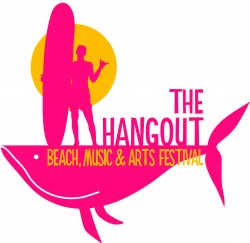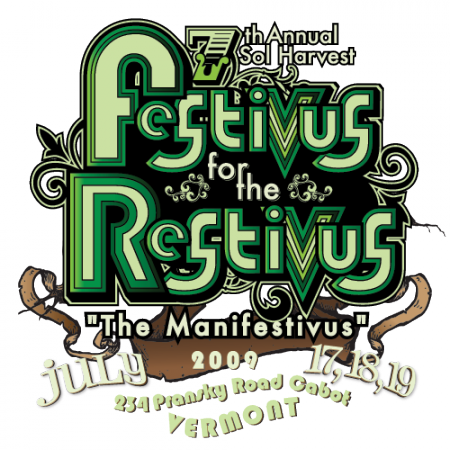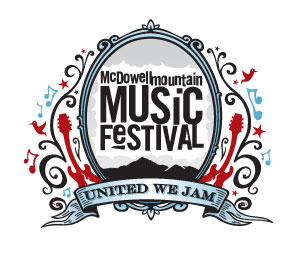An Interview with Toubab Krewe
The members of Toubab Krewe
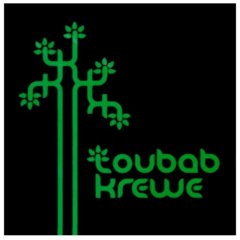
Teal Brown: Drum set
Drew Heller: Electric guitar, soku, fiddle, keyboards
Justin Perkins: Kora, Kamelengoni, electric guitar, vocals, percussion
David Pransky: Electric bass guitar, three string cigar box bass, mandolin
Luke Quaranta: Djembe, Krin (Kolokolos), log drum, scraper, Sangban, Kinkini and various percussion
Drew Heller: Electric guitar, soku, fiddle, keyboards
Justin Perkins: Kora, Kamelengoni, electric guitar, vocals, percussion
David Pransky: Electric bass guitar, three string cigar box bass, mandolin
Luke Quaranta: Djembe, Krin (Kolokolos), log drum, scraper, Sangban, Kinkini and various percussion
Harper's Ferry - Boston, MA
Start with a strong sense of tranditional West African music, stir in the extended solos and exploratory melodies of American Jam music, add a dash of creole and surf music and you have one very unique sounding band: Toubab Krewe. Toubab Krewe is a five man internationally touring American instrumental jam band from Asheville, NC. Though a relative newcomer to the scene, Toubab Krewe has already made a name for themselves playing at such festivals as Rothbury, Bonnaroo, and the famous Festival au Desert I was lucky enough to sit down with Drew Heller, guitarist before their show in Boston, MA and speak with him about the background of the band; musical influences; a new album in the works; the band's experience at Festival au Desert (in the sahara desert); the band's summer plans and more. Read the transcript below or listen to the audio here:

The members of Toubab Krewe
Would you mind introducing the band members and what instruments they play?
Drew Heller: Sure. Teal Brown is from Asheville, NC. He plays the drum set and the congas.
And then thereís Luke Quaranta, whoís from New Rochelle, NY and he plays the Djembe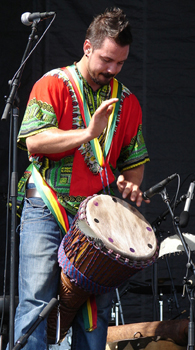 Luke on Djembe
Luke on Djembe 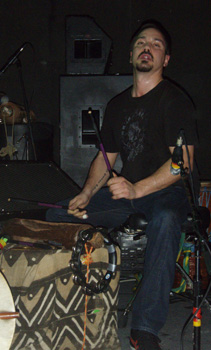 Luke on Krin,
scraper,
Sangban
Luke on Krin,
scraper,
Sangban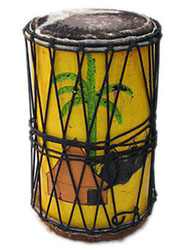 , Kinkini and various percussion instruments.
, Kinkini and various percussion instruments.
David Pranksy, bass player, and he plays three string Cigar box bass Three string cigar box bass
and also regular
four string
Three string cigar box bass
and also regular
four string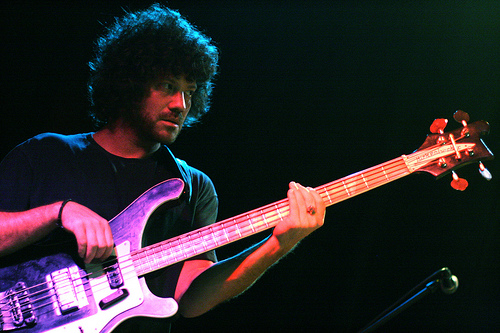 Four string bass.
He also plays mandolin, and some guitar.
Four string bass.
He also plays mandolin, and some guitar.
Justin Perkins: he plays the Kora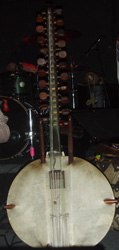 Kora,
the Kamelengoni
Kora,
the Kamelengoni Kamelengoni,
the electric guitar, he sings-- heís our occasional vocalist and he also plays percussion.
Kamelengoni,
the electric guitar, he sings-- heís our occasional vocalist and he also plays percussion.
And my name is Drew Heller, and I play the electric guitar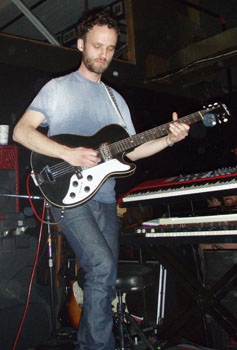 Drew Heller plays the electric guitar,
the keyboards,
the fiddle
Drew Heller plays the electric guitar,
the keyboards,
the fiddle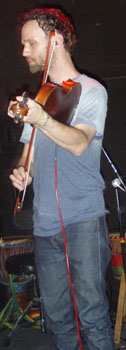 Drew Heller plays the fiddle,
and occasional shouting and hollering, and Iím from Asheville, NC.
Drew Heller plays the fiddle,
and occasional shouting and hollering, and Iím from Asheville, NC.
Justin is from Asheville, NC, and Teal our drummer, the three of us are from Asheville, we grew up there together, and Dave Pranksy, our bassist is from Cabot, Vermont; and Lukeís from New Rochelle, New York.
And then thereís Luke Quaranta, whoís from New Rochelle, NY and he plays the Djembe
 Luke on Djembe
Luke on Djembe credit: Marc Shapiro
,
Krin (log drum) Luke on Krin,
scraper,
Sangban
Luke on Krin,
scraper,
Sangban , Kinkini and various percussion instruments.
, Kinkini and various percussion instruments. David Pranksy, bass player, and he plays three string Cigar box bass
 Three string cigar box bass
and also regular
four string
Three string cigar box bass
and also regular
four string Four string bass.
He also plays mandolin, and some guitar.
Four string bass.
He also plays mandolin, and some guitar.Justin Perkins: he plays the Kora
 Kora,
the Kamelengoni
Kora,
the Kamelengoni Kamelengoni,
the electric guitar, he sings-- heís our occasional vocalist and he also plays percussion.
Kamelengoni,
the electric guitar, he sings-- heís our occasional vocalist and he also plays percussion.And my name is Drew Heller, and I play the electric guitar
 Drew Heller plays the electric guitar,
the keyboards,
the fiddle
Drew Heller plays the electric guitar,
the keyboards,
the fiddle Drew Heller plays the fiddle,
and occasional shouting and hollering, and Iím from Asheville, NC.
Drew Heller plays the fiddle,
and occasional shouting and hollering, and Iím from Asheville, NC. Justin is from Asheville, NC, and Teal our drummer, the three of us are from Asheville, we grew up there together, and Dave Pranksy, our bassist is from Cabot, Vermont; and Lukeís from New Rochelle, New York.
And how did you meet those other guys?
Drew: College. Warren Wilson College, down in Asheville.
Who are some of your greatest musical influences? Either yours personally or as the band as a whole?
Drew: Lets see. Doc Watson is a huge musical influence. His guitar playing is definitely a big influence on me. As is Django Reinhardt, a great gypsy jazz guitarist who recorded a lot between the late 20ís and basically around the time of his death in 1953. Jimmy Hendrix of course, grew up listening to a lot of Jimmy Hendrix and Led Zeppelin but also a lot of old time music traditional mountain music. Doc and Merle Watson was one of the first concerts I ever went to go see and it had a big impact on me I think.
My parents were a real big influence on me too. Their record collection has a lot of traditional mountain music from North Carolina. Elizabeth Cotton is one of my favorite guitarists of all time, sheís from North Carolina. I love Joe Falcon, Keith Frank, a lot of Louisiana music, Zydeco music, and early R&B, I love early Little Richard. All kinds of music, really.
My parents were a real big influence on me too. Their record collection has a lot of traditional mountain music from North Carolina. Elizabeth Cotton is one of my favorite guitarists of all time, sheís from North Carolina. I love Joe Falcon, Keith Frank, a lot of Louisiana music, Zydeco music, and early R&B, I love early Little Richard. All kinds of music, really.
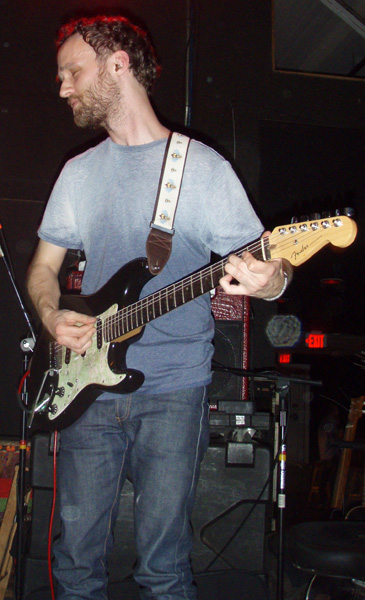
3/25/2010 - Drew Heller on electric guitar
When you said mountain music, does that include bluegrass as well?
Drew: It's mostly pre-bluegrass, but I definitely like bluegrass. They played more traditional music, more fiddle tunes, there's no soloing in it. It's more, "the devil's in the details" kind of music. But I definitely have tried my hand at some bluegrass. I play banjo, but I play Frailing style, the Clawhammer style, and same with fiddle, just sort of play the tune, don't really do too much soloing. Although I started studying the one string fiddle in west Africa, the Soku, and that sort of changed up my fiddle style that I've grown up playing with into somewhat of a hybrid between them.
So back to the influences, I know a lot of them you mentioned have already passed away, but have you ever had the chance to play with any of your influences?
Drew: Yeah luckily. I feel very fortunate.
String Cheese Radio: Which ones?
Drew: Most recently this last summer I got the chance to share the stage with Toumani Diabate, an amazing Kora player. He really is, in the list of people I was talking about, heís at the tip top. That man's musicianship is magic. The album New Ancient Strings-- Iíve listened to that album a hundred billion times. Itís one of my favorite records of all time itís such an amazing work. So that was really surreal and beautiful to play with him. It was actually on the same level for me as getting to play with John Paul Jones from Led Zeppelin. We did a set together at Merle Fest, in Wilkesboro, NC. That set was also with a good friend, Rayna Gellert. Sheís one of my top favorite musicians of all time-- sheís an amazing fiddler. Her bowing hand is super inspiring, so inspiring. Weíve gotten to play a fair amount with her and I feel lucky every time we get to hang out and play music together.
String Cheese Radio: Thatís awesome.
String Cheese Radio: Which ones?
Drew: Most recently this last summer I got the chance to share the stage with Toumani Diabate, an amazing Kora player. He really is, in the list of people I was talking about, heís at the tip top. That man's musicianship is magic. The album New Ancient Strings-- Iíve listened to that album a hundred billion times. Itís one of my favorite records of all time itís such an amazing work. So that was really surreal and beautiful to play with him. It was actually on the same level for me as getting to play with John Paul Jones from Led Zeppelin. We did a set together at Merle Fest, in Wilkesboro, NC. That set was also with a good friend, Rayna Gellert. Sheís one of my top favorite musicians of all time-- sheís an amazing fiddler. Her bowing hand is super inspiring, so inspiring. Weíve gotten to play a fair amount with her and I feel lucky every time we get to hang out and play music together.
String Cheese Radio: Thatís awesome.
If you had to describe Toubab Kreweís music in a single word, what would it be?
Drew: Creole.
SCR: Creole? Cool. A little surprising, but thatís cool.
SCR: Creole? Cool. A little surprising, but thatís cool.
Iíve heard your music described as a fusion of West African and surf music. When Paul Simon released his Graceland album, he got a lot of criticism for using African musical styles. Have you ever faced any similar criticisms as a band?
Drew: No, not really. I think maybe what was happening with Paul Simon, Iím not entirely sure. If I remember right what the controversy was, was that the band maybe had been primarily of South African musicians that were playing music as a band that they were familiar with and Paul Simon was singing over, basically making slight arrangement adjustments to another bands repertoire but then copyrighting everything and owning all the rights. Iím not really sure actually, I canít really talk on it.
SCR: I think it was something with Los Lobos, he stole a song from them.
Drew: Honestly I donít really know too much about what happened with his experience but I know that we have grown up playing so much traditional music that all of the music that weíre playing from West Africa, most of it is traditional. We donít change the names of traditional songs to something else even if we change the arrangement of a traditional song, Djarabi is Djarabi, Mali Sadjo is Mali Sadjo even if we alter it, expand it, explore it, arrange it our own way, or write new melodies that go along with it. I mean itís like the name of the band, Toubab Krewe, Toubab means foreigner, not African: Westerner. We just want to play the best we can play and enjoy all of this as much as we can but not obscure the traditional. Let it just be a living tradition.
SCR: I think it was something with Los Lobos, he stole a song from them.
Drew: Honestly I donít really know too much about what happened with his experience but I know that we have grown up playing so much traditional music that all of the music that weíre playing from West Africa, most of it is traditional. We donít change the names of traditional songs to something else even if we change the arrangement of a traditional song, Djarabi is Djarabi, Mali Sadjo is Mali Sadjo even if we alter it, expand it, explore it, arrange it our own way, or write new melodies that go along with it. I mean itís like the name of the band, Toubab Krewe, Toubab means foreigner, not African: Westerner. We just want to play the best we can play and enjoy all of this as much as we can but not obscure the traditional. Let it just be a living tradition.
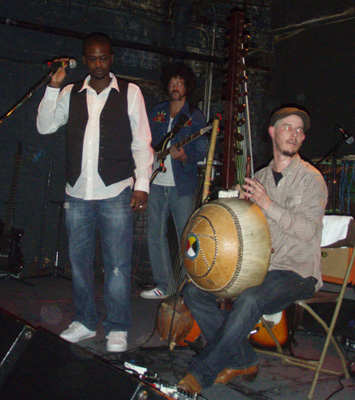
3/25/2010 - Toubab Krewe with guest vocalist
What proportion of your songs are traditional versus original?
Drew: I think itís about half and half. When we first got started on the road and touring and rehearsing it was heavy traditional. And sometimes our set list on a given night might be real heavy traditional or sway way into original territory, but itís hard to figure out what the ratio is. And honestly, even with original music I donít care how deep into the ethers of outer space I feel when Iíve been practicing for five hours and I canít even speak coherently because all Iím doing is sitting there playing, and something comes out of nowhere and itís like "Hold on to that, and what is this? I want to remember this, I want to remember this!"
Even that stuff I know in a strange way itís still coming from some sort of place, not out of nowhere. I donít believe in immaculate conception with music.
I think itís unbelievably mysterious how it works, but I think weíre absolutely responding to things that weíve experienced, you know, and even in ways that we canít even understand, so it stills feels mysterious and beautiful. I feel like everything is related to a degree to tradition.
Even that stuff I know in a strange way itís still coming from some sort of place, not out of nowhere. I donít believe in immaculate conception with music.
I think itís unbelievably mysterious how it works, but I think weíre absolutely responding to things that weíve experienced, you know, and even in ways that we canít even understand, so it stills feels mysterious and beautiful. I feel like everything is related to a degree to tradition.
Who writes your original songs, is it a group effort?
Drew: Yeah, itís absolutely a group effort. Certain things start from one, like we have a song Chasse which comes from a traditional rhythm but then we started adding melodic structure to go with it, which we wrote basically completely from scratch just using the rhythmic melody. Certain songs might start from a Ngoni line or a bass line and we go from there. Certain songs, like the song Area Code we play I started writing in 2007 in Bamako, but it took a year and a half before it got into a place where we even did it in the whole band setting. It sort of moved it into that realm where we were working on it as a band and fine tuning the arrangement of it.
Even when you think that you have it written, once you start performing it you realize all these fine tuning adjustments that you want to make. And other places that feel like "Wow, the territory that just goes right here works" but thereís more than one right way to do something. If instead of turning right, right here we turn left we may end up with a much more expansive territory that would then open up all kinds of other doors and places this could go. Youíre always sort of leaving bread crumbs night to night sort of doing the best you can to enjoy and explore all this territory, you know.
SCR: So it just kinds of grows and evolves as you play more and more?
Drew: Yeah
Even when you think that you have it written, once you start performing it you realize all these fine tuning adjustments that you want to make. And other places that feel like "Wow, the territory that just goes right here works" but thereís more than one right way to do something. If instead of turning right, right here we turn left we may end up with a much more expansive territory that would then open up all kinds of other doors and places this could go. Youíre always sort of leaving bread crumbs night to night sort of doing the best you can to enjoy and explore all this territory, you know.
SCR: So it just kinds of grows and evolves as you play more and more?
Drew: Yeah
Do you use any laptops in planning and creating the music, or is it all percussion and string instruments?
Drew: At this point, thereís no laptops involved. But weíve actually been talking about that a lot, how we sort of are shooting ourselves in the foot by not using the available technology to just be working on the road when weíre not actually in sound check. Like just now, weíve been here setting up at Harperís Ferry all day but because of this technical difficulty and that technical difficulty, the sound check itself when we were actually making sound all together as a band lasted approximately six minutes. So it was all day... for six minutes.
Thereís nothing we can do because we need to move the day along. Heavy Pets are getting their sound check together as you can hear in the background right now so as much as we might talk on the road like: "You know what we should try in this song or that song, you know what might sound really good, what do you think about this? I donít know. Or this part of the songís bothering me." Whatever it is, when we wait until sound check sometimes we have this long span of time and we end up taking advantage of it and we get some really good sessions in. But itís hard to plan on it so we were talking about setting up a little recording studio in the back lounge of our tour bus because it would be pretty easy you know, with a laptop, Pro Tools or Logic and an audio interface, we could use a couple microphones and just sort of go from there. Just lay a guitar part down, or a drum part, or if thereís a drum breakdown or something just one little thing at a time.
Thereís nothing we can do because we need to move the day along. Heavy Pets are getting their sound check together as you can hear in the background right now so as much as we might talk on the road like: "You know what we should try in this song or that song, you know what might sound really good, what do you think about this? I donít know. Or this part of the songís bothering me." Whatever it is, when we wait until sound check sometimes we have this long span of time and we end up taking advantage of it and we get some really good sessions in. But itís hard to plan on it so we were talking about setting up a little recording studio in the back lounge of our tour bus because it would be pretty easy you know, with a laptop, Pro Tools or Logic and an audio interface, we could use a couple microphones and just sort of go from there. Just lay a guitar part down, or a drum part, or if thereís a drum breakdown or something just one little thing at a time.
Toubab Krewe Albums
Are there any plans for another album?
Drew: Yeah, absolutely. We actually have a new record that should be out in August, itís called TK2.
SCR: TK2?
Drew: Yeah, we spent a month and a half recording it earlier in 2009. We'll probably put out a couple songs on EP this summer, in June probably and then put the full thing out in August.
SCR: Thatís your third album?
Drew: Our third album, but our second studio recording. Our second release was a live record.
SCR: TK2?
Drew: Yeah, we spent a month and a half recording it earlier in 2009. We'll probably put out a couple songs on EP this summer, in June probably and then put the full thing out in August.
SCR: Thatís your third album?
Drew: Our third album, but our second studio recording. Our second release was a live record.
Does anyone in the band have any side projects?
Drew: We all play music when weíre not on the road, but none of us have side projects with band names and a touring schedule or anything like that, we all play a lot of music even when weíre not on the road.
SCR: Seems like with Toubab Krewe, the whole process is pretty involved and itís a lot of effort.
Drew: Itís full time, itís definitely full time.
SCR: Seems like with Toubab Krewe, the whole process is pretty involved and itís a lot of effort.
Drew: Itís full time, itís definitely full time.
I know you guys played at the Festival of the Desert in Mali. How did you get invited to that festival and what was that experience like?
Drew: The experience was amazing-- very surreal. So far away from any festival experience weíve ever had before. Just the process of getting there was pretty elaborate. Weíve been back and forth to West Africa a lot of times but this time the easiest part was just getting to Bamako, Mali. From there we opted to buy plane tickets to fly to Timbuktu. When we did that, we flew on this old Russian prop plane.
SCR: Was that a long flight?
Drew: It wasnít too long, maybe two and a half, three hours or so to Timbuktu from Bamako. From there we got into a two wheel drive Jeep and packed ourselves and a bunch of gear into it and went for an epic ride through an unmarked path in the sand dunes towards the festival site which was up in Essakane.
All the sudden out of nowhere, youíve been traveling through the middle of sand dunes in the Sahara then you just show up in this place. Theyíve got generators, the Malian government with the help of the Burkina Faso government, and I think probably some help from some other governments, Iím not sure, but they put it together and itís amazing. Theyíve got all kinds of events that are happening there. Theyíve got one big main stage, but they also have a lot of traditional music that's happening with car battery powered megaphones... and camel racing. You meet a lot of Tuaregs there, itís in Tuareg territory, you know itís a nomadic culture. You meet all kinds of people, Tuaregs who travel for weeks by camel to get to this festival. So itís sort of like, okay... actually our experience getting here, being served a croissant and a Sprite on a flight was pretty easy. I might be a little tired right now, but all I did was just sit here.
SCR: Ha-ha. Yeah
SCR: Was that a long flight?
Drew: It wasnít too long, maybe two and a half, three hours or so to Timbuktu from Bamako. From there we got into a two wheel drive Jeep and packed ourselves and a bunch of gear into it and went for an epic ride through an unmarked path in the sand dunes towards the festival site which was up in Essakane.
All the sudden out of nowhere, youíve been traveling through the middle of sand dunes in the Sahara then you just show up in this place. Theyíve got generators, the Malian government with the help of the Burkina Faso government, and I think probably some help from some other governments, Iím not sure, but they put it together and itís amazing. Theyíve got all kinds of events that are happening there. Theyíve got one big main stage, but they also have a lot of traditional music that's happening with car battery powered megaphones... and camel racing. You meet a lot of Tuaregs there, itís in Tuareg territory, you know itís a nomadic culture. You meet all kinds of people, Tuaregs who travel for weeks by camel to get to this festival. So itís sort of like, okay... actually our experience getting here, being served a croissant and a Sprite on a flight was pretty easy. I might be a little tired right now, but all I did was just sit here.
SCR: Ha-ha. Yeah
Beyond getting there, and I guess the camel racing, how is it different then any festival in North America, as far as music and general environment?
Toubab Krewe's journey to the Festival au Desert (includes their performance)
SCR: Yeah
Drew: So it's laid back, but I'd say that it's...
SCR: Not as prevalent?
Drew: Not as prevalent but itís such a big party that it doesnít really strike you until you're back in the states at a festival and your like, holy shit, we rage in the states, oh my god.
SCR: For sure!
Are there any summer plans established for Toubab Krewe, any festivals?
Drew: Yeah actually one we just found out about, weíre really excited about, weíre going to be in Central Park at Summer Stage with Tinariwen who we first performed with up at the Festival in the Desert. So this will be the first time that weíve shared a stage with them since then, well since both bands have shared the same stage. We played with them up there in the Festival in the Desert and they are an amazing group of musicians, real funky, real funky. We were in Knoxville, TN and they were playing down the street and we were playing the other way and we went and saw their show before our show. We were playing a late night thing and we said hello, caught up for a second, first time weíve seen each other since the festival, and then they came down the street and they jumped on stage and we played about a half an hour together. Really fun. So weíll do that June 26th in Central Park and then what else are we doing? I think we might be going out to the west coast for some festivals...
SCR: Thereís one called The Hangout?
Drew: Oh god, The Hangout, yes! Down in Alabama: Gulf Shores, Alambama. That one looks really fun. Beach party, beach party down there.
SCR: Last year, did you headline one in Vermont or something?
Drew: Yeah, itís actually our bass player Dave Pranksy's, his festival. Festivus for the Restivus.
SCR: Thatís what itís called?
Drew: Yeah last year was really a lot of fun. We had Umu Sangare with us and Barrington Levy and who else was there? We were there...
SCR: Yeah, ha ha
Drew: I canít even recall, it was great fun. And this year, I know that John Brownís Body going to be with us, Giant Panda... Iím not sure, thereís still a lot to be figured out. And weíre playing McDowell Mountain Music Festival. Itís a really fun one down in southwest outside of Phoenix I think.
SCR: Thereís one called The Hangout?
Drew: Oh god, The Hangout, yes! Down in Alabama: Gulf Shores, Alambama. That one looks really fun. Beach party, beach party down there.
SCR: Last year, did you headline one in Vermont or something?
Drew: Yeah, itís actually our bass player Dave Pranksy's, his festival. Festivus for the Restivus.
SCR: Thatís what itís called?
Drew: Yeah last year was really a lot of fun. We had Umu Sangare with us and Barrington Levy and who else was there? We were there...
SCR: Yeah, ha ha
Drew: I canít even recall, it was great fun. And this year, I know that John Brownís Body going to be with us, Giant Panda... Iím not sure, thereís still a lot to be figured out. And weíre playing McDowell Mountain Music Festival. Itís a really fun one down in southwest outside of Phoenix I think.
What about Horningís Hideout?
Drew: Oh, fingers are crossed. We would love to do that, absolutely would love to do that! I donít think we're confirmed to be there, but Iíve definitely heard talk of it.
Do you have anything else you would like to add
Drew: Letís see... I donít know, I just hope everyoneís having a wonderful day whichever day it is that you're listening to this and a great spring and hopefully Iíll see you all soon.
String Cheese Radio: Well thats it. Drew with Toubab Krewe and Jeremy from String Cheese Radio, thanks.
Drew: Thank you.
String Cheese Radio: Well thats it. Drew with Toubab Krewe and Jeremy from String Cheese Radio, thanks.
Drew: Thank you.
The Audio Interview
Toubab Krewe Official Website
T.K. on Facebook
T.K. on Archive.org
The Full Story: T.K. goes to Festival au Desert
Read more band interviews and listen to The String Cheese Incident, Toubab Krewe, Railroad Earth, EOTO and more streaming 24/7 on stringcheeseradio.com 